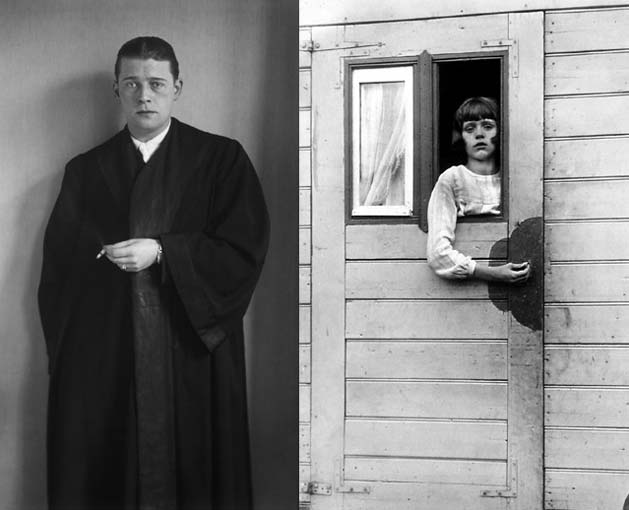relationships

New research indicates that holding a pose that opens up a person’s body and takes up space will alter hormone levels and make the person feel more powerful and more willing to take risks.
“These poses actually make you more powerful,” said study researcher Amy C.J. Cuddy, a social psychologist at the Harvard Business School.
The opposite also proved true: Constrictive postures lowered a person’s sense of power and willingness to take risks. (…)
The basic idea is that the mind/body relationship is not a one-way street, with the mind giving orders for the body to carry out. Rather, the body also influences the mind. Other studies have indicated, for example, that holding an expression, like a smile, can alter one’s mood, as can a hunched posture.
{ LiveScience | Continue reading }
photo { Francesca Woodman, Self-portrait, 1975-78 }
relationships, science | October 11th, 2010 7:20 pm

Couples develop their own language of love that ebbs and flows depending on the state of their relationship, scientists believe. (…)
The study suggests style matching has the potential to quickly and easily reveal whether any given pair of people — ranging from business rivals to romantic partners — are psychologically on the same page and what this means for their future together. (…)
The researchers extended their work by analysing friendships such as that between Sigmund Freud and Carl Jung who wrote to each other almost weekly over a seven-year period as their careers were developing.
Using style-matching statistics, the authors were able to chart the two men’s tempestuous relationship from their early days of joint admiration to their final days of mutual contempt.
{ Telegraph | Continue reading }
photo { Lee Friedlander }
ideas, psychology, relationships | October 5th, 2010 2:39 pm

According to the research, over 95% of males have masturbated to orgasm by age 20, compared to around 60% of women (with some studies suggesting an even larger gap).
The discrepancy with regard to masturbation is doubly problematic because masturbation, it turns out, is a particularly important predictor of sexual health and happiness for women, more so then for men. One of the best predictors of whether a woman will be able to achieve orgasm in her sexual relations is a history of masturbation in adolescence.
Why such a gap? One reason may be men’s higher sex drive. If you define sex drive as preoccupation with sexual behavior and thoughts, including sex crimes and paraphilias, then men routinely manifest higher levels of it than women. Such elevated interest may lead to higher masturbation rates. Structural differences may also play a role. A penis is highly accessible and regularly handled in the act of urination, which may lead to greater familiarity with its potential uses. (…)
According to Thomas W. Laqueur, a professor of history at the University of California at Berkeley, masturbation was not a topic of great interest to the powers that be until 1712, when a con man named John Marten anonymously published a book spectacularly entitled: Onania; or, The Heinous Sin of Self Pollution and all its Frightful Consequences, in both sexes Considered…
{ PsychologyToday | Continue reading }
photo { Nobuyoshi Araki }
psychology, relationships, science, sex-oriented | October 5th, 2010 2:33 pm

You can’t really thank your parents for being more than parents without crying and making everyone uncomfortable. You have to tell them that you ran out of Benadryl and you’re congested but that if you were to think of your most beautiful memory, it might be thirty seconds outside a Burger King in 1994. And for a second they don’t know what you mean, but then they know what you mean, like they always have.
{ Wipe your feet | Continue reading }
photo { Agnes Thor }
experience, kids, relationships | October 5th, 2010 2:00 pm

New study finds groups demonstrate distinctive ‘collective intelligence’ when facing difficult tasks. (…)
That collective intelligence, the researchers believe, stems from how well the group works together. For instance, groups whose members had higher levels of “social sensitivity” were more collectively intelligent. “Social sensitivity has to do with how well group members perceive each other’s emotions,” says Christopher Chabris. (…)
The average and maximum intelligence of individual group members did not significantly predict the performance of their groups overall. (…)
Only when analyzing the data did the co-authors suspect that the number of women in a group had significant predictive power. “We didn’t design this study to focus on the gender effect,” Malone says. “That was a surprise to us.” However, further analysis revealed that the effect seemed to be explained by the higher social sensitivity exhibited by females, on average.
{ EurekAlert | Continue reading }
photo { Helmut Newton }
ideas, psychology, relationships | October 1st, 2010 5:45 pm

Real misogyny happens every day. The fabric of modern life is sodden with sexism, crusted with a debris of institutional discrimination that looks, from a distance, like part of the pattern. (…) They make sexual comments about women in the street.
{ Laurie Penny/New Statesman | Continue reading }
photo { Garry Winogrand | New York, 1968 }
relationships | September 27th, 2010 4:52 pm

Babies can readily differentiate pet dogs and cats from “life-like” battery-operated toy dogs and cats. Babies will smile at, hold, follow, and make sounds in response to the live animals more than in response to the toys. In one study, 9 month olds were more interested in a live rabbit than an adult female stranger or a wooden turtle. A 1989 study of 2- to 6-year-olds with animals in their classrooms showed that children ignored realistic stuffed animals (80% never looked at them), but that live animals - especially dogs and birds - captured the attention of the children. Seventy-four percent touched the dog, 21% kissed the dog, and more than 66% talked to the bird.
Living with pets seems to stimulate children’s learning about basic biology. In one study, Japanese researchers showed that kindergarteners who had cared for pet goldfish better understood unobservable biological traits of their goldfish, and gave more accurate answers to questions like “does a goldfish have a heart?” (…)
When asked to name the 10 most important individuals in their lives, 7- and 10-year-olds on average included 2 pets.
{ Thoughtful Animal/ScienceBlogs | Continue reading }
animals, kids, psychology, relationships | September 27th, 2010 3:17 pm
books, relationships | September 26th, 2010 11:38 am

It is a cliché that the brain is the “largest sex organ,” but the repetition of the phrase doesn’t make it any less true. The mechanics of its role during sex are less obvious and less well understood than that of the body’s other sex organs, but by using brain imaging scans, neuroscientists have begun to get a sense of what parts of the brain light up during sex, especially at the moment of orgasm. (…)
One early study of orgasms suggests that the subjective experience of orgasm is very similar between men and women. Despite having different anatomies, men and women seem to be hard-wired to experience sexual pleasure in the same way. But does this translate to a similarity in the brain? (…)
Much more so than men’s brains, female brains go mysteriously silent during orgasm. In particular, the left lateral orbitofronal cortex and the dorsomedial prefrontal cortex, areas involved in self-control and social judgment, respectively, are deactivated. Brain activity also fell in the amygdala, suggesting a similar, albeit more drastic, drop in vigilance and emotion as in men. “At the moment of orgasm, women do not have any emotional feelings,” Holstege was quoted as saying.
{ Big Think | Continue reading }
painting { Mark Sheinkman, Lourel, 2010 | oil, alkyd and graphite on linen }
brain, relationships, science, sex-oriented | September 24th, 2010 1:06 pm

The world is more complex and less controllable than ‘rational’ planners believe. There are two main reasons for this. First, as behavioural economics tells us, agents - be they individuals, institutions or governments - do not necessarily behave rationally; their responses when confronted by new information or a different set of incentives may be hard to anticipate.
Second, as the study of networks shows, our tastes and preferences can be altered directly by the behaviour of others and can change over time. Natural selection is now believed to favour social learning strategies that specify when and whom to copy. It seems that humans are particularly adept at this. (…)
In the late 1990s, a group of epidemiologists, sociologists and physicists analysed a database of individuals and their sexual contacts. The results were published in Nature, one of the world’s leading scientific journals. They found that most people have only a few sexual partners, but that a small number have hundreds or even thousands. The real originality of the paper was its finding that the structure of the pattern of the contacts closely reflected a recently discovered type of network that is described as ‘scale-free’.
Such networks are important in the natural sciences, and more of them - at least, good approximations of the scale-free pattern - have been discovered in the human world. The internet, for example, has these properties. A few sites receive a massive number of hits, while most get very few. A whole industry has grown up in American marketing circles trying to find these influential ‘hubs’. (…)
Another important type of network that makes life even more complicated is the ‘small-world’ network. When we delve into the maths, there are considerable similarities between a scale-free and a small-world network. But their basic social structure is different. In the scale-free network, there are a few agents who have huge potential influence. The small world is much more like overlapping sets of ‘friends of friends’. The additional feature is that, while no one has a large number of connections, a few agents may have ‘long-range’ connections to others who are remote from their immediate cliques. However, these individuals may be even harder to identify in practice than the hubs of a scale-free network, precisely because they themselves are not distinguished by having an unusual number of connections.
{ RSA Journal | Continue reading }
The World Wide Web, with its potential to connect people globally, was paradoxically a technology that connected people locally.
{ RSA Journal | Continue reading }
Rumors of the web’s memory are greatly exaggerated.
Jeffrey Rosen has an engaging piece in the Times about privacy and the web that touches on issues of forgiveness and reputation and how the Internet has basically screwed that up for all of us; the upshot being that because your Facebook profile never really goes away, your sins are plastered on the world’s largest wall for all to see forever.
Here’s the thing. They’re probably not. Forever, that is.
{ Big Questions Online | Continue reading }
As data volumes continue to grow, it’s clear that the Internet’s infrastructure needs upgrading. What’s not clear is who is going to pay for it.
{ Der Spiegel | Continue reading }
photo { Manuel Vazquez }
ideas, relationships, social networks, technology | September 23rd, 2010 10:57 am
books, relationships | September 22nd, 2010 2:20 pm

{ Every adopted child wonders who his biological mother is. | AOL News | full story }
mystery and paranormal, relationships | September 21st, 2010 2:25 pm

Biologists who study mutualism have long believed that the solution to cheating is to punish cheaters—but a new model suggests that the benefits gained from playing nice might be enough to deter cheating.
{ denim and tweed | Continue reading }
photos { 1. Ron Jude | 2 }
economics, fire, halves-pairs, psychology, relationships, science | September 15th, 2010 1:32 am

It turns out that, when males and females are scanned by fMRI while told to close their eyes and not think about anything in particular, their brain activations are virtually the same.
Researchers examined the brain activity of 26 females and 23 males who rested in a scanner and daydreamed.
{ Neuroküz | Continue reading }
photos { August Sander }
brain, relationships, science | September 14th, 2010 11:59 am

A fascinating new paper in Psychological Science explores an apparent paradox of eavesdropping: It’s harder to not listen to a conversation when someone is talking on the phone (we only hear one side of the dialogue) than when two physically present people are talking to each other. Although the phone conversation contains much less information, we’re much more curious about what’s being said.
{ Wired | Continue reading }
image { Phil Hale }
relationships, science | September 13th, 2010 2:00 pm

Four dozen Prince George’s County police cadets had searched a wooded area in Glenn Dale for the BlackBerry of a woman who had been killed in her Upper Marlboro home. They found nothing.
Five days later, a county homicide detective, Benjamin Brown, the lead investigator into the strangulation of Antoinette Renee Chase, started a weekend night shift by driving back to the area. Brown suspected Chase’s husband but needed evidence before he could put him in handcuffs.
Brown, a Boy Scout leader who attained the rank of Eagle Scout, knows maps and Global Positioning System devices. The day of the slaying, the victim’s BlackBerry had made or received a phone call that placed the device within 200 meters of a particular location in Glenn Dale. Brown plugged longitude and latitude coordinates into his GPS device and identified an area about 300 meters from where the cadets had searched.
Behind a strip shopping mall, the detective inspected another wooded area. Nothing. He retreated to the shopping mall’s asphalt and, using a screwdriver, pried open a heavy metal storm drain cover. Then a second. Then a third. Jackpot.
On a ledge, Brown saw a plastic bag. Inside the bag, he found a purse that belonged to Antoinette Chase. At the bottom of the storm drain, Brown spotted another plastic bag, which had water shoes and work gloves. The shoes were the same size as those worn by Antoinette’s husband, Spencer Ellsworth Chase, according to court testimony. The work gloves contained the DNA of both Chases, according to testimony.
{ The Washington Post | Continue reading }
photo { Horst P. Horst, Costume for Salvador Dalí’s Dream of Venus, 1939 | The Original Copy: Photography of Sculpture, 1839 to Today | MoMA, NYC, August 1–November 1, 2010}
incidents, law, pipeline, relationships, technology | September 12th, 2010 5:26 am
relationships, visual design | September 4th, 2010 7:41 am

The next time you feel angry at a friend who has let you down, or grateful toward one whose generosity has surprised you, consider this: you may really be bargaining for better treatment from that person in the future. According to a controversial new theory, our emotions have evolved as tools to manipulate others into cooperating with us.
Until now, most psychologists have viewed anger as a way to signal your displeasure when another person does you harm. Similarly, gratitude has been seen as a signal of pleasure when someone does you a favour. In both cases, emotions are seen as short-term reactions to an immediate benefit or cost.
But it’s more cunning than that, says John Tooby, an evolutionary psychologist at the University of California, Santa Barbara. Anger, he says, has as much to do with cooperation as with conflict, and emotions are used to coerce others into cooperating in the long term.
Tooby and his colleagues think that our anger or gratitude reflect our judgement of how much the other person is sacrificing enough for us – and whether they will continue to do so in future.
For instance, you might feel angry towards a friend who broke a dinner date to watch a TV programme, but not at one who did so to take his child to the hospital. Tooby points out that the harm to you is the same in each case, but the first friend’s behaviour indicates his low regard for your interests – triggering anger – while the second friend’s does not. (…)
Stronger men and more attractive women were quicker to anger, too, Sell reported last year.
{ NewScientist | Continue reading }
psychology, relationships | September 2nd, 2010 12:12 pm

Contrary to the Machiavellian cliché, nice people are more likely to rise to power. Then something strange happens: The very traits that helped leaders accumulate control in the first place all but disappear once they rise to power. Instead of being polite, honest and outgoing, they become impulsive, reckless and rude.
Psychologists refer to this as the paradox of power.
{ Wall Street Journal | Continue reading }
psychology, relationships | August 26th, 2010 4:00 pm






















